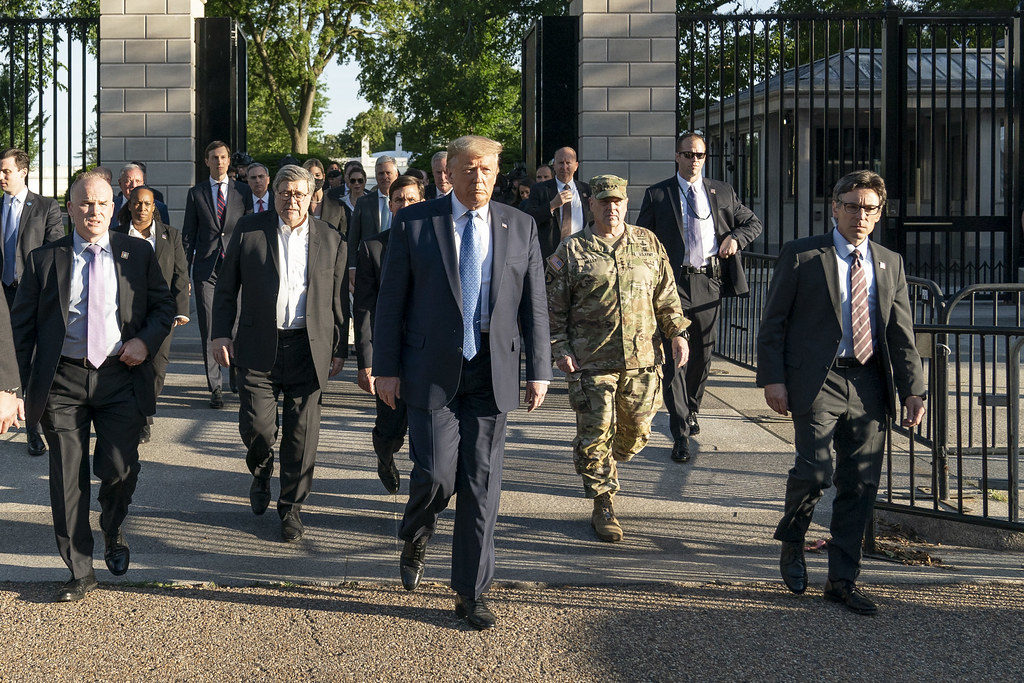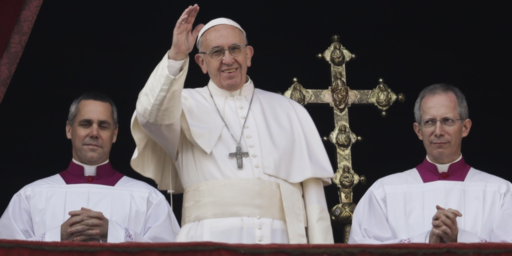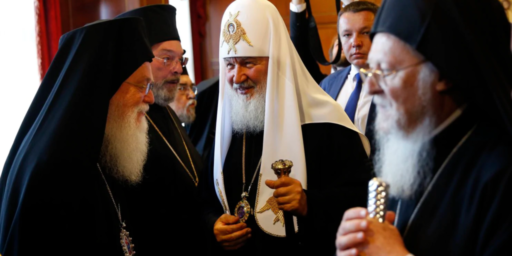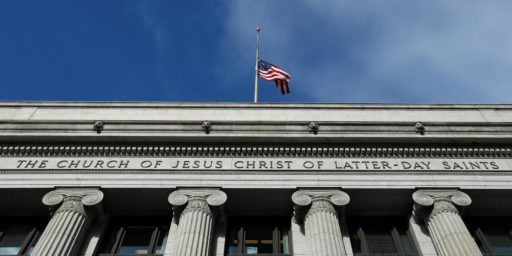Civil-Military Crisis?
My latest for Defense One has published.

Defense One has published my essay, “This is Not a Civil-Military Crisis.”
The intro:
Mara Karlin, a former senior defense official and national security scholar, rightly laments that retired general officers are having an outsized role in our national political debate. But she’s off the mark when she exclaims, “If this isn’t a civil-military relations crisis, I don’t know what is.” Rather, the crisis is that they’re having to speak out at all.
The conclusion:
That defenses of the First Amendment and our founding principle that all men are created equal are seen as an indictment of the sitting President and his party is a sad state of affairs. But there has been no suggestion from any officer, active or retired, that the military should solve that for us. If that changes, we will indeed be in a crisis.
There’s a whole lot—the piece runs 1300 words—in between. It’s a somewhat wonky dive into the complexities the civ-mil debate but worthwhile if you’re in to that sort of thing.





Link?
@Kathy: Thanks! Fixed in the OP as well.
Refusing to obey an order from the President as illegal is a choice military personnel should never have to make. Because it’s going to undermine institutions one way or another. There is no good answer. One of the bad answers is better than the other, to be sure, but there’s nothing good about the situation.
And we know exactly who has brought us to this situation, don’t we? Ideas like rule of law and freedom of expression mean nothing to him. What he cares about is whether “looks like a jerk”, or “dominates the landscape”. Our best hope is in his cowardice and laziness. A more competent and energetic person with that attitude would probably do a much better job of wrecking America.
Why yes, actually, I am.
Good article by the way. Thinking back through history, we have had a number of top generals go into politics and even become President starting with Washington: Jackson, Harrison, Taylor, Hays, Garfield, Eisenhower.
I think the nature of national politics has changed over time. Pre-civil War Presidents had limited presidential power. The Civil War was so all consuming that everyone was involved so politicians using military experience as a prop was minimized. Same with WWII and Eisenhower. But even then there was concern about military having too much influence (think Seven Days in May).
Today, there is a greater mil-civ divide because we have a couple of generations that grew up in a non total war environment perhaps leading politicians more likely to use the military as props. The only modern General to actively campaign was Wesley Clark and perhaps Colin Powell.
It didn’t start with the last Presidential campaign but there was a great increase of parading military figures as part of the campaign apparatus. That may have not been good in the long run.
@Jay L Gischer:
Actually, unless the situation is absolutely clear, it is impossible to know what is legally correct. So much revolves on presumptions but the average serviceman (and even high ranks) are not going to have military lawyers around to get a legal reading. And my experience with military lawyers is that the legal reading you’ll get is : It depends.
@Scott: I think I agree with what you are saying. It sounds right to me. And it seems like you are disagreeing with something, but I’m not sure what.
Ambiguity doesn’t make this situation easier. It makes it harder, doesn’t it?
I don’t think Mattis was writing to us, the general public. I think he was writing to Trump and to military officers, and good for him.
It was necessary for someone to warn Cadet Bonespurs that he does not have the US Army at his back. It was a brave and good deed that signaled Trump he may face mass resignations if he goes too far. Mattis’ editorial may save officers and men from having to make impossible decisions between chain-of-command and the Constitution.
Trump should not have crossed the line making Mattis SecDef, but he did. I mean, who cares about tradition or mores when you’re draining the swamp, right? By elevating Mattis to SecDef, he – as commander in chief – effectively moved Mattis from military to civilian spheres. Mattis did the right thing under circumstances which were in no way his fault.
My reading of the situation may be off, but I strongly suspect that there is, in fact, a civil-military relations crisis.
To me, at least, it seems that the Pentagon, rather than the Executive or Congress, has decided that the current situation does not warrant invocation of the Insurection Act. The Pentagon also doesn’t want active duty troops deployed on the streets of Washington DC.
I’m not saying the Pentagon is wrong (they may, in fact, hold the more defensible position from a Constitutional point of view), but it should not be up to them to decide whether or not the Insurrection Act may be invoked.
Again, I may be off, but my strong impression is that if Trump were to order active duty troops into the states to quell the ongoing protests, he would not be obeyed. I also suspect that he knows.
It doesn’t seem a coincidence that NG troops sent by loyalist governers from as far away as Utah are currently in DC. I think that at least part of the reason that they are there is because the military brass said no to deploying elements from the 82nd Airborne and other active duty units.
It’s not Mattis’ and Mullen’s statements as such that constitute the civil-military relations crisis, it’s that their statements encouraged their former peers to (to some extent) usurp a power that, properly speaking, belongs to the presidency.
The fact that this (suspected?) conflict is not out in the open, hides, to a significant extent, how dangerous the current situation is.
@Michael Reynolds:
This is an excellent point. Writing to Trump to elicit a nasty response. That response shows military personnel that the C&C’s support for them is conditional upon their loyalty to him, not country.
@Kurtz:
True, but Trump’s support for anyone is conditional on that person’s utter loyalty to him. And even then, there are no guarantees.
@Michael Reynolds:
I thought specifically to the officers. Mainly, “This man regards you as his personal security force, is likely to demand that you behave that way, and you should think a lot about where you draw the line.”
I was thinking the other day that in military coups it always seems to be the colonels that do the dirty work. Why is that?
@Jay L Gischer: No, I don’t disagree at all. Just adding on to your comment and reacting (not to you) to the common statement that you can disobey an illegal order. Yes, but, how do you know what is legal or not? It’s not that simple.
@Scott: I see. At home we sometimes say, “you were agreeing at me”.
@Michael Reynolds:
@drj:
My take is that military officers swear, in part, to “support and defend the Constitution of the United States against all enemies, foreign and domestic.” And Mattis et. al. intend to do so even if the enemy sits in the Oval Office.
Just out of curiosity: I remember having to swear to “protect and defend the Constitution of the United States” when I got my first passport. When did it become “support and defend”?
While I Grant you, Scott, that you were probably doing this off the top of your head, and I agree that “The Civil War was so all consuming,” are you not taking for Granted one Civil War figure whose Civil War service might have set him apart for the presidency? I will Grant you three guesses.
The real question is how many officers are as crazy as Michael Flynn?
And in absolutely shocking news, Lindsay Graham apparently has been using male sex workers for decades. They call him Lady G. He makes them sign NDAs. I’m no lawyer, but I can’t really see how that helps if soliciting sex work is illegal.
@Joe:
Did you watch the History Channel 3-parter on Grant? It’s better than you might expect.
He’s long been a hero of mine. My writing pseudonym is a steal from him.
@Modulo Myself:
My thoughts exactly. Times like this I miss Doug Mataconis. OTB needs a lawyer on staff.
@Michael Reynolds:
It was somewhat loosely based on Ron Chernow’s biography of Grant, was it not?
@Michael Reynolds:
I did not see it, but will look for it if it every gets a wider release. About a year ago I finished Chernow’s excellent biography of Grant. It was interesting to contrast Chernow’s generally positive view of Grant with the more jaundiced view shared by Blight’s recent and excellent biography of Douglass.
Incidentally, the weekend before Illinois went to stay-at-home status, my girlfriend and I substituted a quick trip to Galena, Illinois for our recently cancelled Paris plan. Grant’s home there was already closed due to Covid concerns, but it didn’t look very well cared for even from the outside. That was too bad. But I did get to muse about how to of the most consequential characters of the Civil War both came out of very under-assuming circumstances from the then-Western frontier of Illinois.
@CSK:
It was, with some additional commentary from historians plus Ta-Nehisi Coates and Petraeus.
@Joe:
We got lucky with two dudes from nowhere with weird first names: Abraham and Ulysses. With a big assist from a Tecumseh.
@Joe: Well, that is embarrassing. Especially since Grant was the first one I was thinking of. I think trying hard to think of the others, I just put him aside.
@Michael Reynolds: Abraham is a weird name? You’re a worse Jew than me.
@Michael Reynolds: Yes. The History Channel documentary was better than I feared, which is to say better than their WWI documentary that makes out that Patton and MacArthur won WWI. The Grant documentary suffered from having a lot of material to cover in six hours. They talk of his strategic sense and his resolve. What impresses me is that in Mexico he’d been a Commissary lieutenant. A year after reenlisting he commanded an army at Shiloh. That’s a hell of a learning curve. The History Channel did OK with the Vicksburg campaign, but I don’t think conveyed just how impressive it was. I’ve always felt that if the Grant of Shiloh commanded the US Army in the Peninsula Campaign, instead of McClellan, Lee would have emerged from the Seven Days (which might have been a couple days) as a nobody and the war would have ended as it should have in 1862.
They did skim through his presidency, but I was put off by their saying a couple times that Grant’s efforts to support reconstruction were thwarted by northerners’ reluctance to pay for it. I fear it was more than parsimony that made them reluctant to support Blacks.
@Wr:
Oy!
@gVOR08:
It could have used another episode at least.
@Modulo Myself: What!? Seriously? No, seriously?
@Scott:
Yes. The civ-mil debate is not settled but most allow for this. That is, hanging up the uniform and running for office is a clean break. You’re no longer speaking as a retired four-star but as a politician. What most deplore is endorsing candidates or taking partisan positions while under the cloak of the military rank.
@drj:
I agree. But, to me, the crisis is that we have an unstable narcissist wielding powers designed to be applied by a patriot doing his best for the citizenry of the country. While he’s just talking about the Insurrection Act, they have the right to trying to dissuade him. And to appeal to Congress to do their fucking job.
@CSK: The current oath was set into statute in 1966; I’m not sure what it was before then.
@James Joyner:
Don’t get me wrong: I’m not criticizing the Pentagon. Far from it.
But when your country needs to be saved by the generals, there is a real problem.
In dire circumstances, sometimes a bad precedent needs to be set, but that doesn’t mean that this precedent won’t cause trouble down the line.
Another example of the deep damage caused by Trump and his enablers.
This week I had a discussion with my son (Army, NCO) about what it would mean to be given orders to fire on civilians. I asked him to consider the impact on his country, his career, his family – before that order comes. And he is close enough to retirement to be able to smell it.
A terrible position to be in.
I hope your son never has to make that choice.